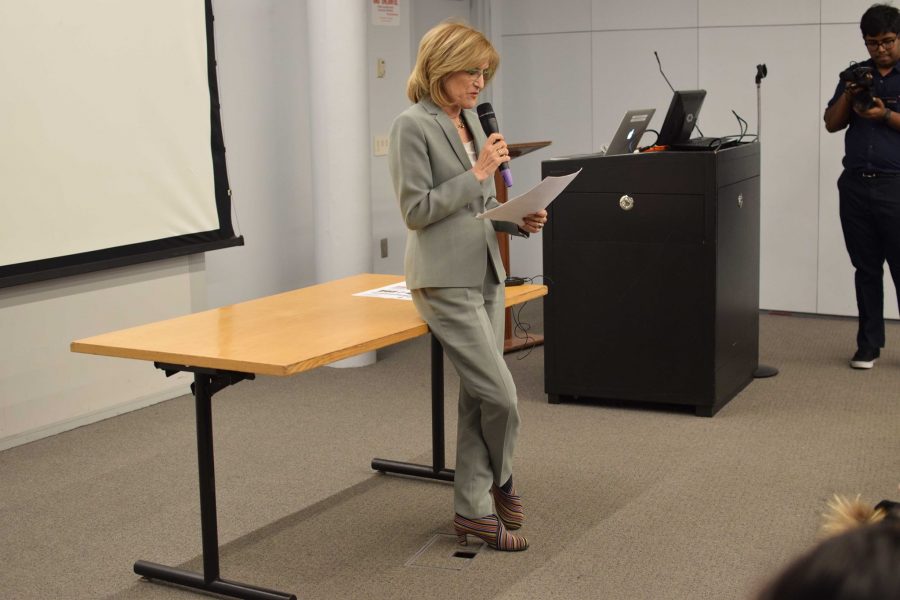Conscious Lenses at News and Doc Festival
Marcia Rock speaking at NYU’s News and Doc Film Festival 2017. At the event, graduate students from the News & Documentary Program presented 30-minute short films pertaining to subjects they were passionate about.
February 13, 2017
“Who knows?” Marcia Rock responded when asked what social impact she expected from the documentaries of NYU’s News and Doc Film Festival 2017. “They have all the potential.”
From Feb. 3-4, the festival presented 10 senior thesis films from the News & Documentary Program — a master’s track in the Arthur L. Carter Institute of Journalism. Rock, the director of the program, said these films are supposed to be a launching point for the graduate students’ careers.
Aside from being the director of the News and Documentary Program, Rock is also an independent filmmaker with three Emmy’s. She described the specialties of this Master’s-level program as “unlike conventional film programs, [as] it emphasizes a lot on journalistic research and the visual context of a story.”
The graduate students — with diverse backgrounds and storytelling schedules — crafted 30-minute short films about topics that personally interested them. Students spent a summer shooting in places like the United States, China, Ukraine, India and Sri Lanka, and then they returned to school to finish editing and post-production.
Rock compared creating the films to raising children.
“They [the students] stretch themselves as they make the films in these three semesters,” Rock said.
Because the projects were individualized, the 10 films covered a variety of topics — from an American family adopting a disabled child from China to a drag queen from Kentucky moving to New York City to find himself and his tribe of fellow queers.
On the second day of the festival, however, the topics shifted to a more serious tone. For example, “This Divided Island,” directed by Hafeel Farisz, is the story of two young women from Sri Lanka who were recruited by the proscribed terrorist organization the Tamil Tigers to fight government forces. Then, approaching from a more micro perspective, Kaitlin Sophia Sprague’s personal documentary “Our Brother Jordan” recounts the story of healing and combating the stigma surrounding mental illness through the lens of her older brother’s suicide and the familial fallout that ensued.
After the documentaries were screened, the directors answered the audience’s questions. Many, like Qingzi Fan, mentioned the unpredictability of the filmmaking process.
“When I first started, I didn’t want to make the film about politics at all,” Fan said after the screening of her film “One Way Home.” “But when I got in the schools in Tibet, those political issues just stood right in front of me.”
Utilizing humor, Fan’s film depicts the lives of two Tibetan children chosen to study in boarding school in mainland China, who must prepare themselves to be the new elites through a first-class education. But this comes at the price of losing their original identity, language and culture.
Jan Kobal, director of “If I Can’t Dance at Your Revolution, I’m Not Coming,” said that his film evolved as he worked on it.
“At first I just wanted to make a film about electronic music, and the idea sort of just developed as the shooting went,” Kobal said.
His film discusses youth underground culture in the face of the Ukrainian government’s corruption and ineptitude three years after the Maidan Revolution.
The documentaries showcased at the festival were the culmination of the students’ time in the program. As the filmmakers begin their professional careers, some said they plan to expand their work to feature-length films, while others said they’ll submit their projects to film festivals.
The News and Documentary Program is welcoming its new class, and Rock shared a suggestion for these aspiring filmmakers.
“Get guidance when you are young, and keep working to develop stories in your own style,” Rock said
A version of this article appeared in the Monday, Feb. 13 print edition. Email Olia Zhang at [email protected].























































































































































